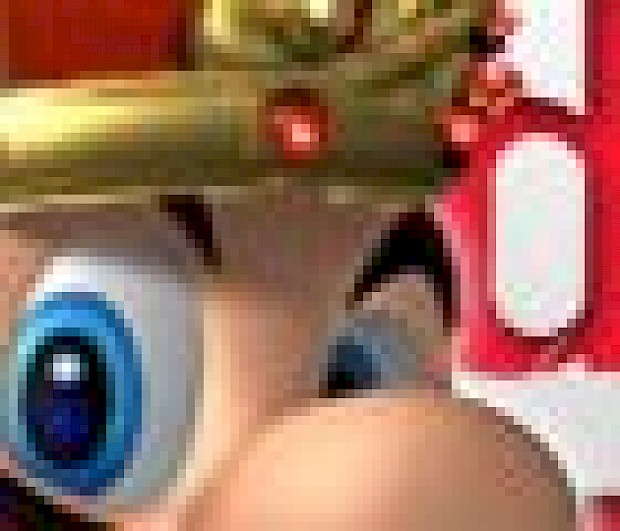Feature: Comeback King

Posted 20 Oct 2006 at 18:36 by guest

| "This time Nintendo faced the dual challenge... Fans did not give the big N a chance. I was one of them." |
On the eve of a new console release, Nintendo fans are once again facing the doomsday scenarios. The Japanese giant has been perennial also-ran to Sony throughout the 90s and into the 2000s. In the last generation Nintendo took home the bronze after PlayStation 2 and Microsoft's Xbox. Nintendo games are the first to be removed from shop shelves. Yet the predictions of Nintendo's demise are premature. In fact, they were premature an entire decade ago, which was the first time I heard the phrase "This is it for Nintendo".
UnderNintendogs
As Sony exploded onto the scene in the mid-1990s, and quickly consolidated its position with the PlayStation, Nintendo found itself for the first time playing catch-up to a younger, trendier model. By the time the Nintendo 64 was about to hit the shelves, the chunky, pricey, cartridge-based system looked dated to many. "This is it for Nintendo" was the considered opinion of PlayStation-owning friends and industry commentators.
So what went right? Some Nintendo fans have pointed to the success of the Pokemon franchise as the main reason Nintendo kept afloat through those lean years. Others point toward Rare, as if the British developer and a handful of titles kept its parent company in the game (GoldenEye was a huge commercial and critical hit, but Nintendo's "success" in this period cannot be put down to one game). For me, it was the continuing popularity of the Game Boy � and its new colour iteration � that provided Nintendo with stability in the late 90s, combined with the profits derived from N64 hardware.
Triple Alliance
The bane of Internet gaming forums is the risible effort by some gamers (and "industry analysts") to imagine the industry as a political battlefield of shifting allegiances. Perhaps the two Japanese games makers could team up against the insurgent Microsoft? Actually, what if the two "hardcore" sets of Nintendo and Microsoft gamers ally to defeat the casual gaming menace of Sony? Recently there has been talk of a "Wii60", with gamers supposedly making the tactical choice of Nintendo and Microsoft's offerings to the exclusion of the PlayStation 3. The nadir is the question: "What if Nintendo made games for Sony/Microsoft (delete as appropriate)?". Imagine playing the new Zelda, but without the gimmicky Wii wand, and online, with overpriced downloadable content!
Or not. Why not instead just play Zelda on a Nintendo machine? I never fully understood the mentality of those who shook their head at Nintendo's revered franchises, only to posit a gaming world in which those titles would be somehow "better" on another machine (no reasons are ever given). If Microsoft bought Nintendo outright, think of all those franchises that you never played or liked before, but now on a powerful system! The Japanese developers have all left to form different studios, but we've still got the rights to Mario, Metroid and Zelda, if not the programmers!
Some of you may think I am caricaturing certain gamers' views in order to ridicule them more easily, but I genuinely have heard the words "Well, you think of Microsoft's money" coming from a grown man's mouth in response to the impending sale of Rare in 2002: as if cold hard cash could somehow directly translate into imaginative game design or interesting gameplay. Sorry: we found out the hard way you can't turn lead into gold.
Always Outnumbered...
And so another generation, and another call of "This is make or break for Nintendo." This time Nintendo faced the dual challenge of an invincible Sony and the lumbering threat of Xbox. Fans did not give the big N a chance. I was one of them.
After witnessing the demise of Sega after the Dreamcast debacle, I had thrown my lot in with those journalists who predicted that Nintendo would go the same way � it would no longer be profitable for Nintendo to design, manufacture and sell hardware and software, and so GameCube would be their last console. Nintendo would go software-only. And granted the GameCube was not a stunning success.
But did it really need to be?
Nintendo's ability to turn a profit on its consoles, in contrast to the loss-making approach of Sony and Microsoft, combined with its loyal fanbase, has enabled it to adapt and survive in a hostile gaming world. Not only has Nintendo consolidated that niche market, it has run Microsoft a close third worldwide; crushed the Xbox comprehensively on home turf (in fairness, who didn't?); and continued to build on Game Boy's success. More than that, with the DS Nintendo has reached out from that niche market to those traditionally uninterested in games. While others have talked about making gaming more "mainstream", Nintendo has actually done so.
... Never Outgunned
And here we are again. Another "make or break" moment for Nintendo. Another "this is it" endgame. For the third time in ten years. Perhaps those analysts and gamers who fancy themselves as gaming industry mavens should not, to borrow the word invented by the current White House incumbent, "misunderestimate" Nintendo.
There's some trepidation regarding the Wii; a gnawing dread on the part of other companies and close-minded gamers that Nintendo might just be onto something. Sony is especially jittery, faced with the cold reality of an innovative � and significantly cheaper � rival console. If the Wii and its new control system enable traditional non-gamers to play video games, Nintendo may well run away with this generation. Even if this does not pan out, the fact remains that Nintendo is releasing its third console since its recognized 16-bit heyday. It has made more comebacks than Elvis and Sinatra. Another "last chance" moment for Nintendo? Only until the next one.
Nick Bennett
[email protected]






















